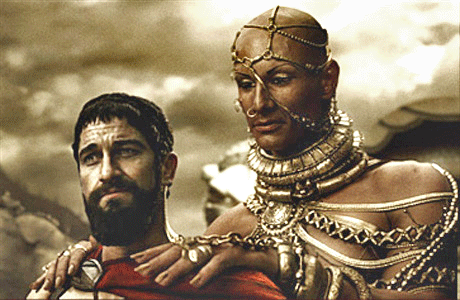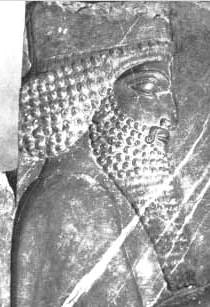April 12, 2007 Visually and aesthetically, 300 is an impressive movie. Unfortunately, it is also a jingoistic bastardization of history that, intended or not, reinforces our cultural prejudices against Iran and the Middle East. Based on Frank Miller’s graphic novel of the same name, it tells the story of the Battle of Thermopylae, but only in the broadest sense does Miller get the story right. For example: • 300 Spartans led by King Leonidas did die in a futile but valiant stand against King Xerxes’s massive Persian invasion force in 480 bce; Miller also gives a good depiction of the austere cruelty of Spartan society, which included infanticide and a brutal military regimen the state inflicted on boys from age seven to 19, but like many ahtists, Miller was dissatisfied with the historical record and committed needless embellishments and distortions. The result is a falsified history remarkable mostly for its preposterous depiction of the Persian King Xerxes. Compared to his father Darius I and grandfather Cyrus the Great, Xerxes was not a particularly able king. He was repressive, vindictive and petty, but he deserved to be portrayed with some measure of honesty. His portrayal as an effeminate drag queen elicited vigorous condemnation, especially from Iranian Americans. In response,Warner Brothers studios offered this typical retort: “The film 300 is a work of fiction inspired by the Frank Miller graphic novel and loosely based on an historical event. The studio developed this film purely as a fictional work with the sole purpose of entertaining audiences; it is not meant to disparage an ethnicity or culture or make any sort of political statement.” Ah, so that makes it all right, does it? Miller and Warner Brothers invoke the “it’s just entertainment” defence and we’re supposed to excuse deliberate inaccuracies?! If that holds for moviemakers, perhaps it should also hold elsewhere: • “Excuse me, your honour, I did not commit perjury. I just meant to entertain the jury.” If Miller had written a genuinely fictitious story based on the Battle of Thermopylae nobody would care. Instead, he fictionalized real people and events, and then Warner Brothers compounded the fraud by making a movie about it and having the gall to defend it as a “work of fiction”—a caveat that appears nowhere in the film’s advertising. Honest reinterpretation of an event is one thing—falsifying events for the sake of entertainment is quite another: A comparison with the authoritative account of the battle in Book 7 of Herodotus’s Histories, shows just to what extent Miller distorted the historical record, and gives further proof that Hollywood’s licence to lie must be revoked. 300’s Mutated Moral Message A frustrated Leonidas is then seen speaking about his dilemma with his wife Gorgo, who says: “Do not ask what a king would do. Do not ask what a husband would do. Ask what a free man would do.” In other words, the moral message of the movie is: the law be damned; do what’s right! Fallacy #1 “[Leonidas] had come to Thermopylae, accompanied by the 300 men which the law assigned him, whom he had himself chosen from among the citizens, and who were all of them fathers with sons living. The force with Leonidas was sent forward by the Spartans in advance of their main body, that the sight of them might encourage the allies to fight, and hinder them from going over to the Medes [Persians]…They intended presently, when they had celebrated the Carneian festival, which was what now kept them at home, to leave a garrison in Sparta, and hasten in full force to join the army. The rest of the allies also intended to act similarly; for it happened that the Olympic festival fell exactly at this same period. None of them looked to see the contest at Thermopylae decided so speedily; wherefore they were content to send forward a mere advanced guard…” (emphasis added) Not only was Leonidas not an outlaw, but the decision to hold back the army was done out of complacency—not because of a pacifistic dictum. To reinvent Leonidas as a rogue hero, Miller also depicted the ephors as hideous priests à la the evil emperor in Star Wars, the effect of which made those who supported lawful conduct seem ugly and immoral, whereas the “rogue warrior” Leonidas appeared morally superior and heroic. Given recent history, it is easy to see how this juxtaposition could be applied to the U.S.’s illegal warmongering against Iran and Iraq, which is contrary to international law. I doubt that Miller had this equation in mind when he wrote 300, but it is there nonetheless, and cannot help but further pervert our attitudes toward Iran.
Fallacy #2 Spartans rarely participated in collective defense with other city-states, because its soldiers were needed to prevent helot uprisings. A contemporary analogy would be Israel’s occupation of Palestine and its reliance on the U.S. military to fight its battles. In addition, the relationship between Sparta, Athens and other city-states is misrepresented. Early on, Leonidas disparages Athens as a city of philosophers and boy-lovers, implying that Spartans were manly men who did not practice pedophilia. Fact is, homosexuality between men and boys was common throughout Greece, and many Spartan boys accompanied their “lovers” into battle. Similarly, the interconnectedness among the Greek city-states is almost entirely absent. Although Miller does show 1,000 Arcadians joining Leonidas’s forces, this is depicted as an incidental offer, rather than a deliberate attempt by Leonidas to recruit allies. In all, 4,000–5,000 Greeks from Corinth, Philius, Mycenae, Thespis, Thebes, Phocis and other cities came to Thermopylae led by their own captains. This fact is important because within each city there were pro-Persian and pro-Greek factions, and many cities offered earth and water to Xerxes’s emissaries as a sign of submission. Only Sparta and Athens refused. The force at Thermopylae, then, was a genuine Greek alliance, not just a Spartan show of bravado. Fallacy #3 “O ye men who dwell in the streets of broad Lacedaemon! After the fifth day of fighting, Ephialtes, a Greek from Malis, told Xerxes of a goat path though the mountain, and he led the Persian army around behind the Greek defences. Herodotus reports that Leonidas saw that the Greek allies now had no heart to fight on and dismissed them, except for the Thebans and Thespians, of whom Miller makes no mention. In explaining why Leonidas deliberately sacrificed Spartan, Theban and Thespian lives in futile battle rather than retreat to a more defensible position like the Isthmus of Corinth, Herodotus writes: “The remembrance of [the Oracle’s] answer, I think, and the wish to secure the whole glory for the Spartans, caused Leonidas to send the allies away. This is more likely than that they quarreled with him, and took their departure in such unruly fashion.” Thus, we are invited to see Leonidas as a vainglorious, suicidal king who thought that by his own death he could save Sparta and raise the stature of his city. Whether the Greek stand at Thermopylae was wasteful or heroic, it did give the Athenians time to flee the city for the safety of Tiryns and the Island of Salamis before Xerxes’s army sacked it. For that reason, the Spartans and other Greeks at Thermopylae are justifiably revered as defenders of Greek independence. If Miller wanted to play up the Spartan role and glorify Leonidas he did not have to distort events and perversely caricature Xerxes or the ephors as he did. Similarly, his depiction of Ephialtes as a very deformed hunchback served no purpose. If I seem particularly exorcised about 300, it is because I am a long-time student of Greek history, and I suspect that the average, uncritical moviegoer who knows little of the subject will come away accepting Miller’s distortions as fact. Why not? Iran (Persia) and its leadership are regularly vilified and distorted in our media with nary a word of protest. • “Iran is a military threat to Israel”—it isn’t. It’s a sad commentary on our “free society” that historically dishonest crap like 300 can be made and defended, but an honest, scholarly investigation into the fate of European Jews during World War II stands no chance.
| |||||||||

